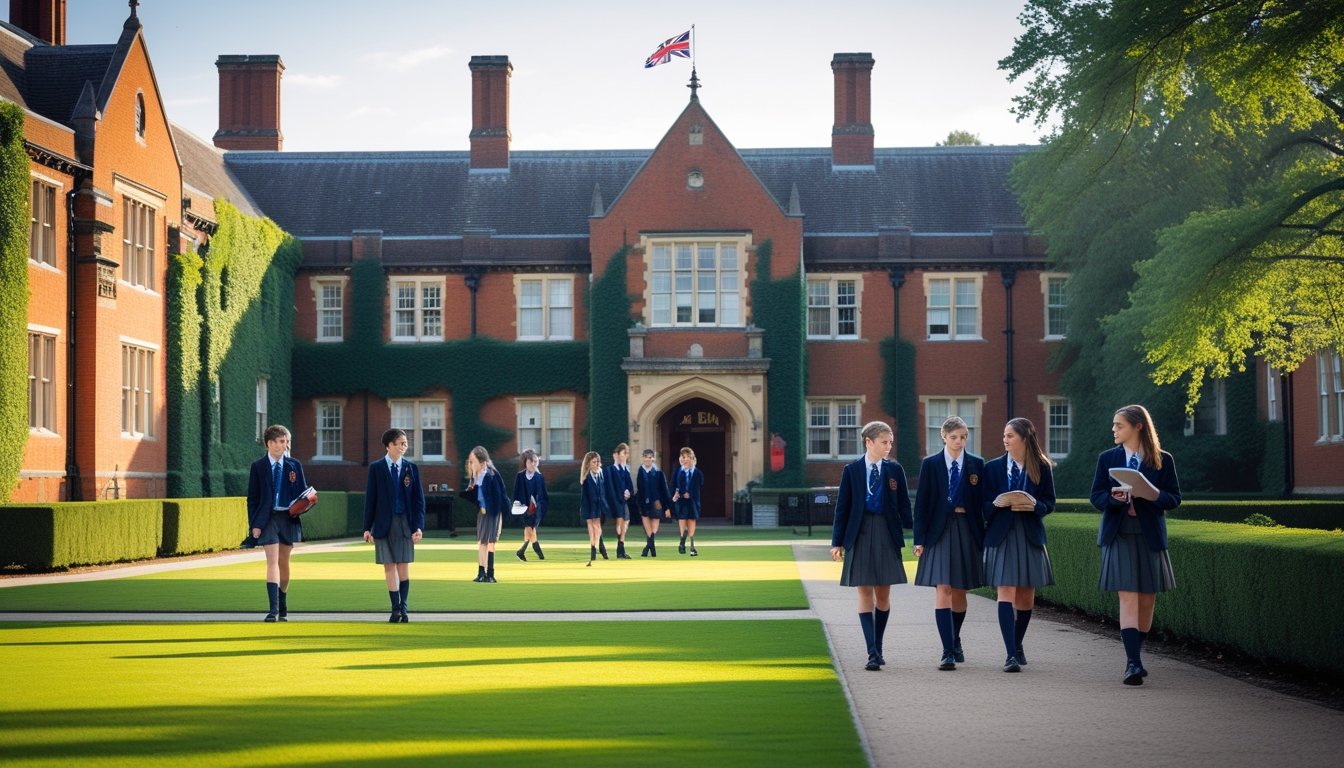Late updated: 08 Aug 2025 15:08
Written by:
Understanding Boarding Schools In The UK: A Comprehensive Guide
Discovering the nuances of UK boarding schools unfolds a rich tapestry of history, academic excellence, and cultural diversity. These institutions are renowned for nurturing students to achieve their fullest potential, offering an immersive learning experience that extends beyond traditional education. Understanding the intricacies of the admissions process, school types, and life at these schools provides invaluable insights for prospective families.

At the heart of the UK's boarding school legacy is a commitment to providing a well-rounded education. Teaching extends beyond textbooks, fostering critical thinking, creativity, and cross-cultural understanding. Students have access to robust academic programmes, catering to various interests and paving a pathway to prestigious universities.
With our exploration, we aim to demystify these revered institutions and provide a clearer lens for families considering this educational journey. From financial considerations to the unique opportunities at each school, our guide presents essential aspects that would benefit anyone researching UK boarding schools.
Key Takeaways
- UK boarding schools offer a well-rounded educational experience.
- Admissions, fees, and academic programmes vary significantly.
- Boarding schools provide pathways to top universities.
Key Aspects of Boarding Schools in the UK
Understanding the varied aspects of UK boarding schools involves examining their defining characteristics, various types, residential life, and notable institutions. This overview should provide a clear insight into what these schools offer to students and their families.
What Defines a Boarding School
A boarding school is an educational establishment where pupils live on campus during the school year. The UK’s boarding schools are known for providing a structured environment that encourages both academic and personal development. With a blend of lessons, extracurricular activities, and pastoral care, these schools aim to foster a holistic approach to education. They typically have facilities such as libraries, sports complexes, and arts centres, which help to create a vibrant learning atmosphere.
Types of UK Boarding Schools
In the UK, boarding schools are classified into independent and state boarding schools. Independent boarding schools are privately funded and often have a long-standing prestige. On the other hand, state boarding schools receive government funding and offer education with lower tuition fees. Both types follow the National Curriculum and offer GCSEs and A-Levels. There are also co-educational, boys-only, and girls-only institutions. These variations allow families to choose a suitable environment based on educational philosophy, financial capacity, and personal preference.
Residential and Social Life
The residential aspect is crucial to the boarding school experience. Students live in boarding houses where housemasters or housemistresses oversee their welfare. This setup aims to create a supportive community where students can thrive. Meals, supervision, and evening activities are coordinated by the house staff, ensuring a stable routine. Social life is equally important, and students engage in a range of activities from sports to arts. House competitions, clubs, and events foster camaraderie and help students build lifelong friendships. Such an environment cultivates independence and social skills as students learn to live and work together.
Prestigious UK Boarding Schools
The UK is home to some of the world’s most prestigious boarding schools. Institutions like Eton College, Harrow School, and Rugby School have a rich history and are respected for their academic excellence. These schools offer a wide array of academic opportunities alongside a wealth of extracurricular activities. Their alumni often include influential figures in politics, business, and the arts, reflecting the education and networking opportunities provided. As premium educational institutions, they have stringent entry requirements and often command higher fees, yet they offer scholarships and bursaries to support talented students from diverse backgrounds.
Academic Programmes, Entry, and Fees

In our exploration of UK boarding schools, it's crucial to examine the academic offerings, entry criteria, and financial commitments involved. Focus here includes the structure of schooling, paths to qualification, the intricacies of admissions, and the financial landscape for attendees.
Academic Structure and Qualifications
UK boarding schools offer a structured and diverse curriculum, catering to various educational stages. In secondary education, students often pursue the General Certificate of Secondary Education (GCSE) during Years 10 and 11. Post-GCSE, students may choose between A-levels or the International Baccalaureate (IB) for their further studies, typically in the sixth form.
A-levels are subject-specific and allow students to specialise. In contrast, the IB programme offers a broader curriculum with requirements in multiple disciplines. Both qualifications are respected globally and can considerably influence university admissions. Academic excellence and personal development are central themes that our schools prioritise, preparing students effectively for higher education and beyond.
Admissions and Visa Requirements
Admission to UK boarding schools involves meeting specific academic and personal criteria. Prospective students must usually provide previous academic records, letters of recommendation, and sometimes attend an entrance exam or interview. Schools look for a strong academic background and extracurricular promise.
International students need to secure a Child Student Visa to study at a UK boarding school. The application requires a confirmed offer of a place from a licensed Student sponsor. The timely completion of visa applications is crucial, as delays can affect admission. It's important for families to engage proactively with admissions departments to ensure compliance with all requirements.
School Fees and Financial Considerations
Boarding school fees vary significantly across the UK and can be as substantial as university tuition. Annual costs might range from £11,400 to £38,000, covering tuition, accommodation, and meals. It's essential for families to plan carefully and account for potential additional expenses such as uniform, travel, or specialist programmes.
Some schools offer financial aid or scholarships based on merit or need, making education more accessible. It's beneficial for parents to explore these options early in the application process. Knowing the intricacies of these financial commitments enables families to make informed decisions about their investment in education.
Frequently Asked Questions

Our exploration of boarding schools in the UK seeks to address some common inquiries. From determining top schools to understanding the intricacies of costs and admissions for international students, we seek to provide insight into several key considerations of UK boarding schools.
What criteria determine the top boarding schools in the UK?
Top UK boarding schools are often recognised for their academic achievements, quality of facilities, and extracurricular offerings. Many also boast robust pastoral care which ensures students' well-being. League tables, inspection reports, and schools’ reputations play a crucial role in determining their standings and rankings.
How does the cost of private boarding schools in the UK compare to state boarding schools?
Private boarding schools in the UK typically charge higher fees compared to state boarding schools. Tuition fees at private institutions can range from £30,000 to £50,000 annually, while state boarding schools may charge lower boarding fees, excluding tuition. This cost difference is largely due to the funding model and facilities provided.
What are the typical admission requirements for international students at UK boarding schools?
For international students, UK boarding schools usually require academic transcripts, a completed application form, and references from previous schools. Some schools may require entrance exams or assessments. Proficiency in English is often necessary, and many schools may offer language support classes for non-native speakers.
How many independent schools in the UK provide boarding facilities?
The UK is home to approximately 500 independent schools offering boarding facilities. These schools vary in size and can cater to different age groups and specialisms. Boarding facilities range from full boarding to weekly or flexi-boarding options, providing flexibility for students and parents.
What are the factors affecting the rankings of boarding schools in the UK?
Rankings of boarding schools are influenced by academic results, university placements, and extracurricular success. Schools’ facilities, pastoral care provisions, and inspection reports are also important factors. These elements collectively reflect a school’s ability to provide a rounded and supportive educational environment.
Can students attend boarding school in the UK for free, and under what circumstances?
While most boarding schools charge fees, there are rare instances where students might attend for little or no cost. Scholarships and bursaries are often available for talented students or those in financial need. Some state boarding schools do not charge tuition fees, covering only boarding costs.
